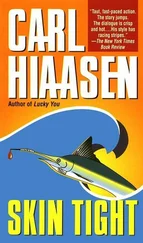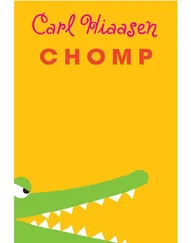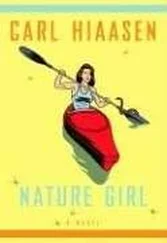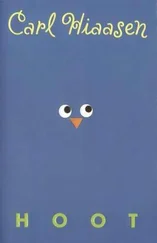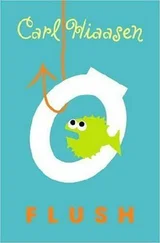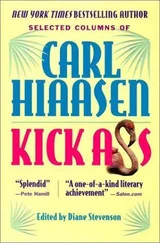Carl Hiaasen - A Death in China
Здесь есть возможность читать онлайн «Carl Hiaasen - A Death in China» весь текст электронной книги совершенно бесплатно (целиком полную версию без сокращений). В некоторых случаях можно слушать аудио, скачать через торрент в формате fb2 и присутствует краткое содержание. Жанр: Детектив, на английском языке. Описание произведения, (предисловие) а так же отзывы посетителей доступны на портале библиотеки ЛибКат.
- Название:A Death in China
- Автор:
- Жанр:
- Год:неизвестен
- ISBN:нет данных
- Рейтинг книги:3 / 5. Голосов: 1
-
Избранное:Добавить в избранное
- Отзывы:
-
Ваша оценка:
- 60
- 1
- 2
- 3
- 4
- 5
A Death in China: краткое содержание, описание и аннотация
Предлагаем к чтению аннотацию, описание, краткое содержание или предисловие (зависит от того, что написал сам автор книги «A Death in China»). Если вы не нашли необходимую информацию о книге — напишите в комментариях, мы постараемся отыскать её.
A Death in China — читать онлайн бесплатно полную книгу (весь текст) целиком
Ниже представлен текст книги, разбитый по страницам. Система сохранения места последней прочитанной страницы, позволяет с удобством читать онлайн бесплатно книгу «A Death in China», без необходимости каждый раз заново искать на чём Вы остановились. Поставьте закладку, и сможете в любой момент перейти на страницу, на которой закончили чтение.
Интервал:
Закладка:
Carl Hiaasen and William Montalbano
A Death in China
PROLOGUE
Changan, China, 213 B.C.
"Where is Confucius?" the emperor demanded.
Princes, nobles, councillors, generals, diplomats, servants and eunuch-ministers mimicked the emperor's angry mien. Square-jawed, flint-eyed, they stared at the cluster of old men whose robes and formal bearing marked them as scholars.
Silence wrapped the throne room. It was not a question to be answered. Everybody knew Confucius had been dead nearly three hundred years.
"Is Confucius in heaven? Where is heaven? What do your books tell you? Is he a bush, or a river, or a bird that flies through the forest? Does he live still?
Tell me, scholars."
The eldest scholar, gnarled as the cane he clutched with both hands, responded in a voice that held no fear.
"Where the master is we cannot say. But his spirit is among us men."
"You know nothing!" the emperor snapped. "Am I then just a man, like any other?"
"You are foremost among men, and more," answered a councillor named Li Su in prayerlike incantation. "You are Qin Shi Huangdi, August Sovereign, the Son of Heaven. You are the Emperor of the Middle Kingdom."
"Have I lived as other men?"
The ritual required a general to answer: Men Qian, the emperor's best.
"Your feats have surpassed all others."
The emperor allowed himself a smile and cocked an eye; a parody of surprise.;
"You have unified the Middle Kingdom," the general continued. "You have given us a great wall, stretching many months' journey, from the great ocean to the desert to protect us from the barbarians. So wide six horsemen may ride abreast.
So tall and so strong that it will never be breached."
"So I am not just any man, am I? I am the Son of Heaven, ruler of the mightiest empire. Tell me, scholars, in your wisdom: Is that not right?"
The old man ran a clawed hand through his wispy beard.
" 'Let the prince be prince, minister be minister, father father and son son.'
So it is written," he said.
The royal fingers kneaded an elaborate bronze chalice, and a serving boy, unnoticed, carefully poured more wine.
"They are all men. Men die. But I am different; the Son of Heaven. I shall not die. My body may stop, but I shall not die. I shall be immortal."
There were none to vouchsafe the emperor a response. The eldest scholar folded his hands around the cane and stared out over the exquisite royal city, where five palaces and fifty temples drowsed in the summer sun.
"I have heard the criticism of the scholars," the emperor said. "They ridicule my dealings with sorcerers and alchemists. They deny immortality because it is not written in their books.
"Scholars! It is not enough for an empire to be strong and orderly. No, they insist as well that the emperor must also be a sage, must also follow the teachings of Confucius, who is not here."
The eldest scholar replied softly, as though rebuking a child. " 'To govern is to set things right. If you begin by setting yourself right, who will dare to deviate from the right?' That is what Confucius said."
"I am the Son of Heaven and I have set things right in this world as I will in the next. You have seen my preparations. They have taken more than thirty years." The emperor cocked his head. "Did you not believe what you saw?"
"I believe in the majesty of the work I saw," the old man said evasively.
"Majesty? Yes, my old friend." The emperor nodded. "Majesty indeed. A mountain whose insides have been carved into the shape of the cosmos by hundreds of thousands of workers who have labored a lifetime. I have made a generation of peasants dig through subterranean streams and seal them off with bronze to create a burial chamber where I shall rule for eternity. Palaces, pavilions-with fine vessels, jewels, stones and rarities. With quicksilver I have created the waterways of the empire, the Yangtze and Yellow rivers, and even the great ocean itself, and made them flow mechanically. Perfect models. And above I have depicted the heavenly constellations, and below, the geography of the earth. All this you have seen?"
"Yes," the old scholar answered.
"And the vaults?"
"Yes."
"Majestic, would you say? Large vaults surrounding the mountain, filled with clay soldiers, thousands of them; infantry, archers, charioteers and generals.
Each carrying a real weapon." The emperor's eyes flashed.
"Your celestial army," the scholar said.
"It will protect my perpetual reign." The emperor emptied his cup. "And having seen my tomb and my army, scholars, can you still deny my immortality?"
There was a long pause then. Every eye was riveted on the small group of scholars before the throne. After the pause, the eldest replied.
"Ideas, like Confucius, are immortal. Men die."
"Fools!" the emperor screamed.
The next day, four hundred and sixty wise men, gathered from all corners of the empire to assay the emperor's immortality, were made to watch as soldiers burned their books.
Then they were led to a deep pit not far from the emperor's celestial kingdom.
From atop the steep sides of the pit jeering peasants shoveled clods of thick red earth. Most of the scholars kept their dignity. A few cursed and one or two of the younger ones cried. Before noon, they were all buried and dead. But then, three years later, so was the emperor, laid to rest under the perpetual vigilance of his fierce clay soldiers.
Chapter 1
Peking, August 1983 The high-ceilinged lobby seemed carved in time, socialist testimony to yesterday's barren promises. A wine-red carpet crawled like a stain toward the horizon. Improvident columns that were neither attractive nor altogether round highlighted bile green walls. The furniture was of blond wood and indeterminate proportion. Waist-high counters cluttered every inch of wall space, each chockablock with white-coated workers. Some were accountants, some receptionists, some managers. Most were watchers.
Tom Stratton threaded through a knot of noisy Americans. He skirted a gaggle of Japanese clustered around a guide waving a flag. He neatly sidestepped a functionary listlessly pursuing a fifty-pound steel vacuum cleaner. Reaching the stand where an empty-eyed girl protected trays of almost fresh fruit, Stratton bought two apples. She weighed them on a digital scale and made change of his one yuan note with an abacus.
"Ba lou," Stratton told the elevator operator in phrase-book Mandarin. He was eventually deposited on the eighth floor.
The room was a monstrous little brother to the lobby, but already, after a week, it seemed like home. Stratton kicked off his shoes and padded into the bathroom.
The hot water tap snuffled and growled, barked and hissed. On past experience, the chances that the water would be hot when it finally appeared were exactly one in two.
Stratton ate the apples and fingered leaves of tea into a thin-walled mug.
Tenderly, he added water from a thermos on the night table, then threw back the red velvet drapes to let in the last rays of sunshine and sprawled on the bed.
It was one hell of a place, Peking. Stratton had not decided whether to love it or hate it. The city sprawled in all directions, a flat, dusty, one-story town punctuated by brick chimneys thrusting toward the smog like phallic exclamation marks. Graceless monuments of revolutionary architecture dwelt alongside exquisite, gold-roofed survivors of the city's imperial past. Stratton scissored off the bed to watch the evening rush hour flow past a hundred feet below. He had just calculated the bicycle flow at nearly five hundred per minute when the room door flew open.
"Comrade! The chairman wants to see you right away."
"Hello, Alice." Stratton stifled a grin behind the tea mug. She had become a China groupie, a parody in blue cotton. The pants Chinese women wear with shapeless abandon strained across Alice's ample rump. The jacket was buttoned to the neck and fashionably wrinkled. The flat-brimmed hat bulged in a frustrated attempt to contain a mass of bottle-blond hair. Clinging precariously to the cap was a sheet metal button, red on white. AAAH, it said.
Читать дальшеИнтервал:
Закладка:
Похожие книги на «A Death in China»
Представляем Вашему вниманию похожие книги на «A Death in China» списком для выбора. Мы отобрали схожую по названию и смыслу литературу в надежде предоставить читателям больше вариантов отыскать новые, интересные, ещё непрочитанные произведения.
Обсуждение, отзывы о книге «A Death in China» и просто собственные мнения читателей. Оставьте ваши комментарии, напишите, что Вы думаете о произведении, его смысле или главных героях. Укажите что конкретно понравилось, а что нет, и почему Вы так считаете.

